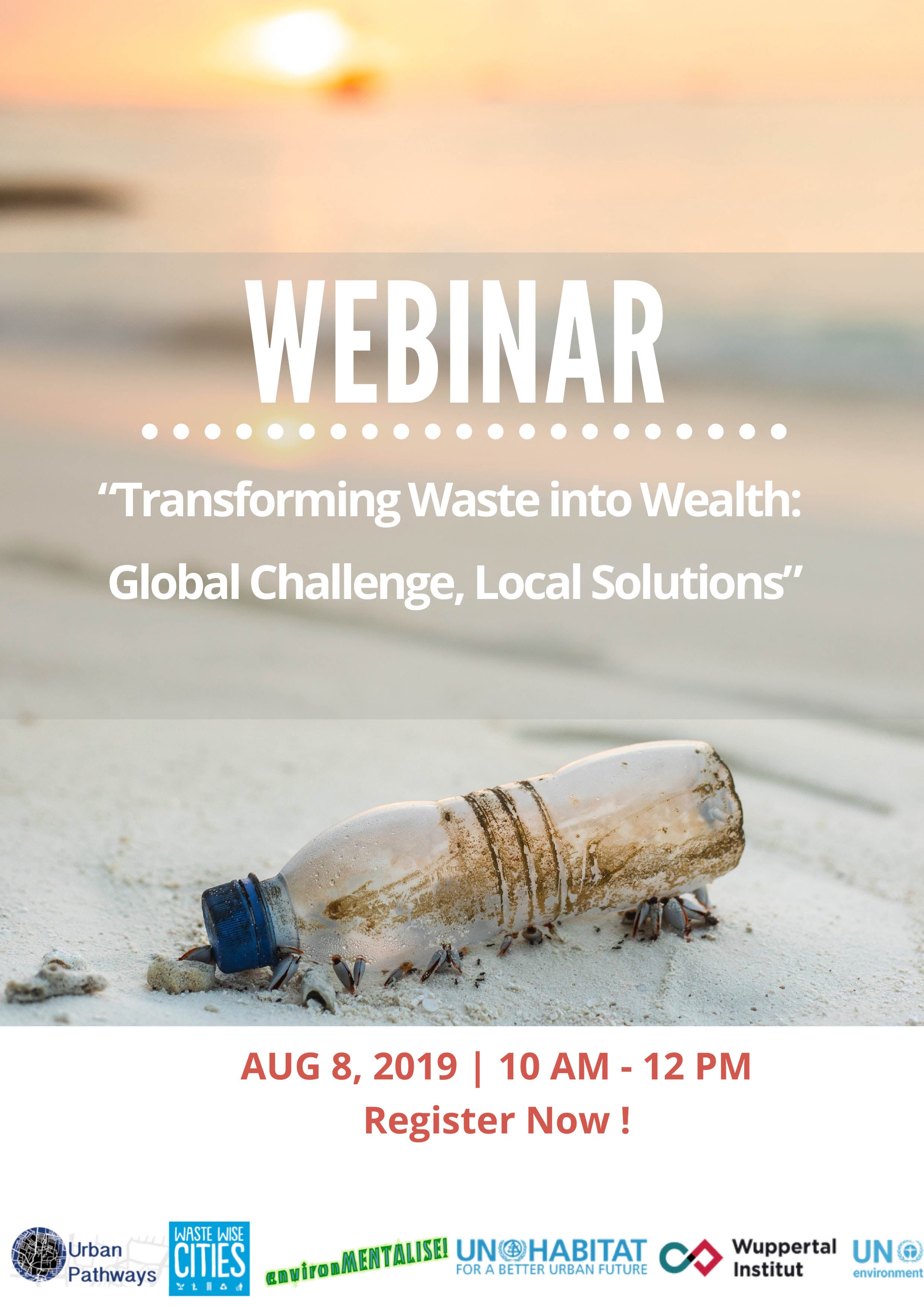The webinar, will will last 1 hour 50 minutes, will be taught in English, Portuguese and Spanish, as the idea is to reach a broad number of cities in developing countries.
-
English version: August, 8th 2019 at 10 AM (CEST) (registration link)
-
Portuguese version: August, 13th 2019 at 3 PM (CEST) (registration link)
-
Spanish version: August, 15th 2019 at 4 PM (CEST) (registration link)
Description
Cities play a key role in meeting the ambitious climate, sustainability and urban development objectives defined in the Paris Agreement, Agenda 2030 and the New Urban Agenda (NUA) in recent years. Urban areas are not only responsible for 80% of energy consumption and 75% of GHG emissions, but also for 2.1 billion tons of municipal solid waste (MSW) generated worldwide each year. The amount of waste produced by individuals is growing daily and costs for waste management often account for a big share of the local governments’ budget. Moreover, insufficient treatment in uncontrolled dumpsites and open waste burning results in serious health problems, as well as water and air pollution.
These facts reflect consumption patterns and lifestyles in cities that are not aligned with sustainable urban development. In order to improve the current state of waste management, reduce the costs related to its collection and treatment and mitigate its impact on the environment, it is utterly important to raise awareness, put waste management polices into place and implement them. Many cities, small businesses and NGOs have already started this journey and have come up with innovative ideas and initiatives that aim at addressing the challenges and capturing the opportunities of sustainable waste management.
In this context, the Urban Pathways Project, funded by the International Climate Initiative (IKI) from the German Ministry of Environment, and implemented by the Wuppertal Institute and UN Habitat, has put together the Webinar “Transforming Waste into Wealth: Global Challenge, Local Solutions”. It aims at discussing and sharing best practice examples and knowledge on policy measures and local waste management initiatives among representatives from Latin American, African and Asian municipalities, research institutions, NGOs, and other stakeholders. The webinar will start with an overview of the current situation and the biggest challenges of waste from a global perspective and will continue with the explanation of measures that can be implemented to reduce their impact at the local level. This will be combined with the presentation of innovative local initiatives being carried out in different cities.
The Webinar is one of the activities that will be carried out under the initiative “EnvironMENTALISE“ – Co-creating safe, friendly and green neighbourhoods”, launched by Urban Pathways to promote the implementation of actions that contribute to raise awareness about the environmental, health, social and economic benefits of non-motorised transport, as well as of waste reduction. In order to have a greater impact, as well as to generate synergies and learning on a larger scale, this initiative will be carried out in collaboration with regional and global awareness campaigns such as the Mobility Week, which includes the International Car Free Day, the World Habitat Day, the Waste Wise Cities Campaign, the SDGs summit and the Walk and Cycle to School Day. All of them are happening between September and October.
As mentioned, the webinar, will will last 1 hour 50 minutes, will be taught in English, Portuguese and Spanish, as the idea is to reach a broad number of cities in developing countries.
-
English version: August, 8th 2019 at 10 AM (CEST) (registration link)
-
Portuguese version: August, 13th 2019 at 3 PM (CEST) (registration link)
-
Spanish version: August, 15th 2019 at 4 PM (CEST) (registration link)
In order to share best practice examples across different countries, the initiatives presented will be summarized into an Urban Pathways Factsheet and translated to English, Portuguese and Spanish to be distributed among the participants.
|
Topic |
Speaker |
|---|---|
|
EnvironMENTALISE - raising awareness for safer, nicer and greener neighbourhoods (5-10 min) |
María Rosa Muñoz Research Fellow at the Wuppertal Institute for Climate, Environment, and Energy Berlin, Germany |
|
Introduction to Waste Wise Cities Campaign and World Habitat Day 2019 Topic: "Frontier Technologies as an innovative tool to transform waste to wealth" (5-10 min) |
Nele Kapp Solid Waste Management Unit Urban Basic Services Branch UN-Habitat |
|
Part A: The challenge: Current situation of waste from a global perspective (15 min)
Part B: Prevention measures and best practices to reduce & recycle the amount of waste (15 min) |
Stefanie Dorneanu Research Fellow at the Wuppertal Institute for Climate, Environment, and Energy Berlin, Germany |
|
Exemplary local initiatives for awareness raising, waste prevention & recycling (15 min each)
|
Kushal Harjani Co-Founder & CEO Doko Recyclers Dr. Rajan Chedambath Director, C-HED, Kochi Municipal Corporation Ratheesh S. State Assistant Program Manager State Poverty Eradication Mission (Kudumbashree) Christopher Muriithi Director Embulbul Environment & Waste Management |
|
Q&A session (15 min) |
Participants |
